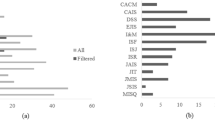Abstract
The rapid progress of the Internet and communication technologies has changed our daily lives dramatically. The presence of the social networking sites (SNS) provides the users new types of communicating media. Understanding SNS users’ needs, getting popular gathering, acquiring potential users and making users stick on the websites are critical for their sustainable operation. Based upon expectation-confirmation model (ECM), this study explores the factors influencing users’ stickiness on SNS. The instrument for data collection was meticulously developed. The partial least squares technique was applied for validating the proposed research model and hypotheses. The findings of this study are expected to provide practical guidance to the SNS owners and serve as instrumental references to the research discipline to understand the causal effects of the related perceived factors that may influence users’ satisfaction, continuance motivation and stickiness towards SNS. That will further enhance the business performance of the SNS operations.
Access this chapter
Tax calculation will be finalised at checkout
Purchases are for personal use only
Preview
Unable to display preview. Download preview PDF.
Similar content being viewed by others
References
Bhattacherjee, A.: Understanding information systems continuance: an expectation-confirmation model. MIS Quarterly 25(3), 351–370 (2001)
Wellman, B.: For a social network analysis of computer networks. In: SIGCPR/SIGMIS Conference on Computer Personal Research, vol. 1(1), pp. 1–11 (1996)
Plant, R.: Online communities. Technology in Society 26(1), 51–65 (2004)
Catherine, R.M., Gefen, D., Arinze, B.: Some antecedents and effects of trust in virtual communities. Journal of SIS 11(3), 271–295 (2002)
Oliver, R.L.: A cognitive model of the antecedents and consequences of satisfaction. Journal of Marketing Research 17(4), 460–469 (1980)
Kim, S.S., Malhotra, N.K.: A longitudinal model of continued IS use: An integrative view of four mechanisms underlying post-adoption phenomena. Management Science 51(5), 741–755 (2005)
Gillespie, A., Krishna, M., Oliver, C., Olsen, K., Thiel, M.: Using stickiness to build and maximize web site value: Owen Graduate school of Management (1999)
Allison, N.C., Bagozzi, R.P., Warshaw, P.R.: Extrinsic and intrinsic motivation to use computers. Journal of Applied Social Psychology 22(14), 1111–1132 (1999)
Maciag, G.A.: Web portals user in, drive away business. National Underwriter Property and Casualty-Risk and Benefit Management 11(1), 1–9 (2000)
Wu, J.H., Wang, S.C., Tsai, H.H.: Fall in love with on-line game. Computers in Human Behavior 26(3), 1271–1295 (2010)
Zeithaml, V.A.: Consumer perception of price, quality and value: a means-end model and synthesis of evidence. Journal of Marketing 52(1), 2–22 (1988)
Sweeney, J.C., Soutar, G.: Consumer perceived interpersonal value: the development of multiple item scale. Journal of Retailing 77(2), 203–220 (2001)
Davis, F.D., Bagozzi, R.P., Warshaw, P.R.: Extrinsic and intrinsic motivation to use computers. Journal of Applied Social Psychology 22(14), 1111–1132 (1992)
Teo, T.S.H., Lim, V.K.G., Lai, R.Y.C.: Intrinsic and extrinsic motivation in internet usage. Omega 27(1), 25–37 (1999)
Hsu, C.L., Lu, H.P.: Consumer behavior in online game communities. Computers in Human Behavior 23(3), 1642–1659 (2005)
Sweetser, P., Wyeth, P.: GameFlow: a model for evaluating user enjoyment in games. Computers in Entertainment 3(3), 7–16 (2005)
Nunnally, J.: Psychometric Theory. McGraw-Hill, New York (1978)
Fornell, C., Larcker, D.F.: Structural equation models with unobservable variables and measurement error. Journal of Marketing Research 18(1), 39–50 (1981)
Chin, W.W.: Issues and opinion on structural equation modeling. MIS Quarterly 22(1), 7–16 (1998)
Author information
Authors and Affiliations
Corresponding author
Editor information
Editors and Affiliations
Rights and permissions
Copyright information
© 2013 Springer-Verlag Berlin Heidelberg
About this paper
Cite this paper
Yeh, R.C., Lin, YC., Tseng, KH., Chung, P., Lou, SJ., Chen, YC. (2013). Why Do People Stick to Play Social Network Sites? An Extension of Expectation-Confirmation Model with Perceived Interpersonal Values and Playfulness Perspectives. In: Nguyen, N., Trawiński, B., Katarzyniak, R., Jo, GS. (eds) Advanced Methods for Computational Collective Intelligence. Studies in Computational Intelligence, vol 457. Springer, Berlin, Heidelberg. https://doi.org/10.1007/978-3-642-34300-1_4
Download citation
DOI: https://doi.org/10.1007/978-3-642-34300-1_4
Publisher Name: Springer, Berlin, Heidelberg
Print ISBN: 978-3-642-34299-8
Online ISBN: 978-3-642-34300-1
eBook Packages: EngineeringEngineering (R0)




